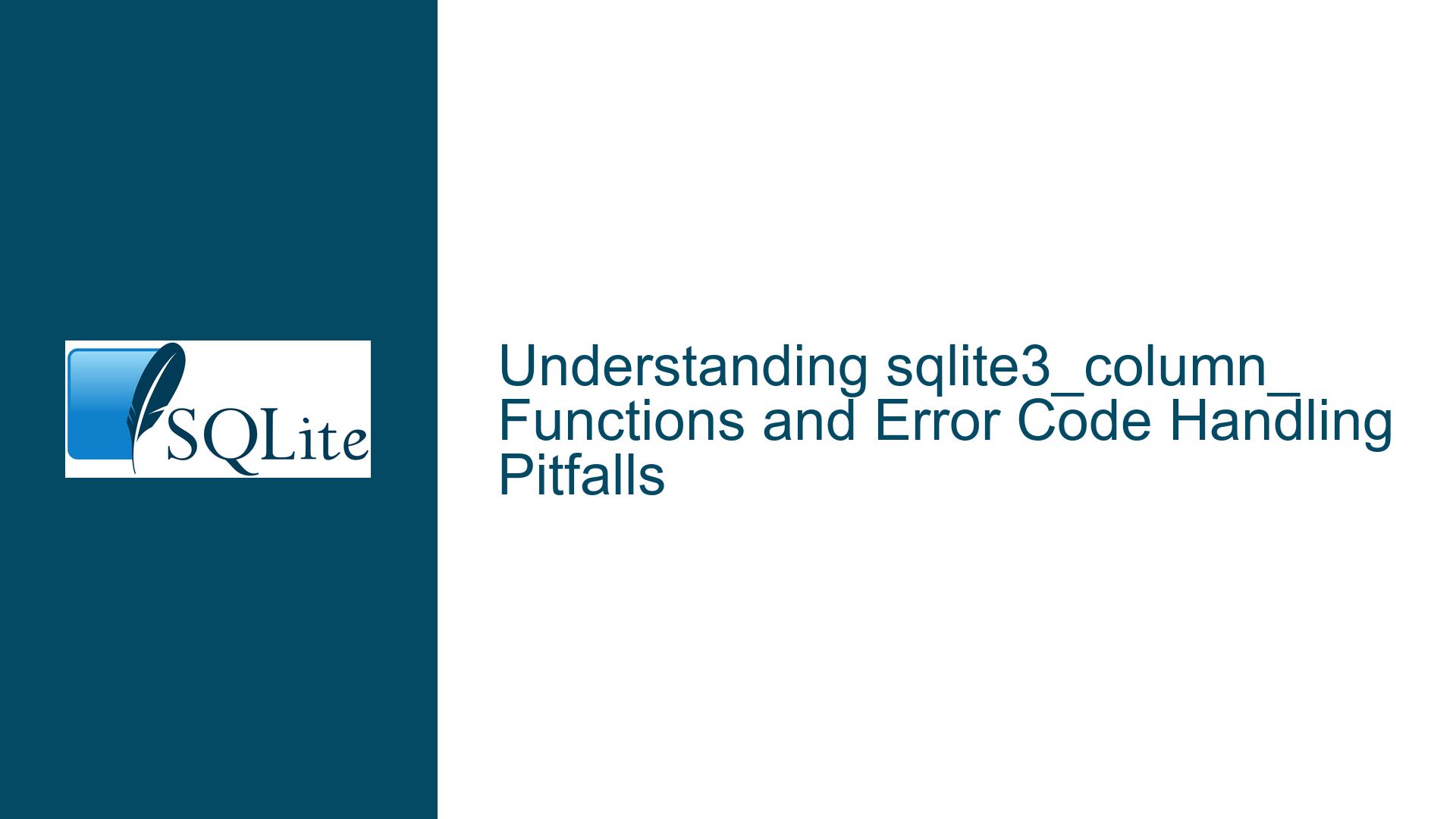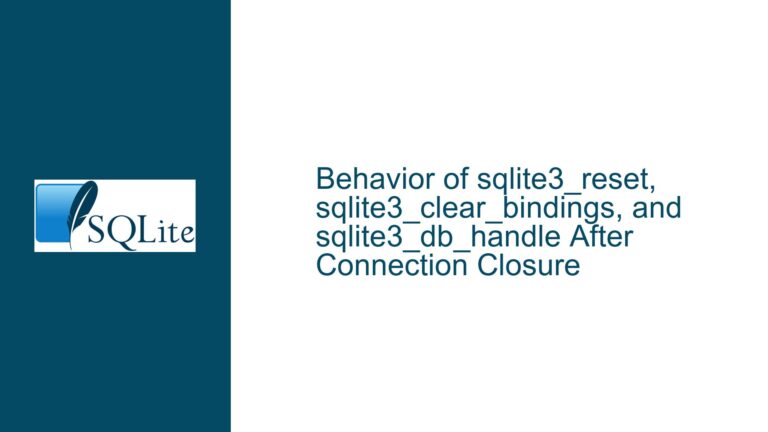sqlite3_column_ Functions and Error Code Handling Pitfalls
Issue Overview: Misinterpreting sqlite3_errcode() After sqlite3_column_ Calls
The core issue arises from misunderstandings about how SQLite’s sqlite3_column_* functions interact with error codes retrieved via sqlite3_errcode(). Developers often assume that checking the global error code after calling sqlite3_column_* functions will reliably indicate success or failure. However, this approach fails because:
- Non-Reset Error Codes: The
sqlite3_column_*functions do not modify the connection’s error code when they succeed. If a prior operation (e.g.,sqlite3_step()) set the error code toSQLITE_ROWorSQLITE_DONE, these values persist even after a successfulsqlite3_column_*call. - Undefined Behavior for Invalid Parameters: Passing invalid parameters (e.g., out-of-bounds column indices) to
sqlite3_column_*functions triggersSQLITE_RANGE, but other errors, such asSQLITE_NOMEM(out-of-memory), are only possible for specific functions likesqlite3_column_blob(). - Type Conversion Side Effects: The
sqlite3_column_type()function returns the initial datatype of a column value. Subsequent calls to othersqlite3_column_*functions (e.g.,sqlite3_column_text()) may implicitly convert the value, altering its effective type and invalidating assumptions about error conditions.
This leads to scenarios where sqlite3_errcode() returns SQLITE_ROW or SQLITE_DONE—non-error codes—even when sqlite3_column_* functions execute correctly. Developers mistakenly treat these as errors, creating unnecessary checks or masking genuine failures.
Possible Causes: Incorrect Assumptions About Error Code Lifecycles
1. Residual Error Codes From Prior Operations
SQLite’s error code system is connection-wide and only updated when an API function explicitly sets an error. For example:
sqlite3_step()returnsSQLITE_ROWfor each row in a result set andSQLITE_DONEwhen complete. These codes are stored as the connection’s "last error."- If
sqlite3_step()returnsSQLITE_ROW, the error code remainsSQLITE_ROWuntil another API call modifies it.
A sqlite3_column_* function succeeding does not reset the error code to SQLITE_OK. Thus, checking sqlite3_errcode() after retrieving a column value will reflect the last non-SQLITE_OK code from an earlier operation, not the result of the column function itself.
2. Lack of Direct Error Reporting in Column Functions
Most sqlite3_column_* functions do not return error codes directly. Instead:
- Functions returning pointers (e.g.,
sqlite3_column_blob()) returnNULLfor bothNULLvalues and errors (e.g.,SQLITE_NOMEM). - Functions returning integers (e.g.,
sqlite3_column_int()) provide no built-in error signaling. Passing invalid parameters leads to undefined behavior, not a detectable error code.
This forces developers to infer errors indirectly, such as by checking if a NULL pointer coincides with a non-SQLITE_OK error code. However, this is only reliable for functions that can fail with SQLITE_NOMEM or SQLITE_RANGE.
3. Misunderstanding Type Conversions and Freshness
The datatype returned by sqlite3_column_type() reflects the value’s initial type before any conversions. For example:
- Calling
sqlite3_column_type(stmt, 0)returnsSQLITE_INTEGERfor an integer column. - Calling
sqlite3_column_text(stmt, 0)converts the integer to a string. - Subsequent calls to
sqlite3_column_type(stmt, 0)may now returnSQLITE_TEXTor an undefined value, depending on the SQLite version and build options.
This "type freshness" rule means that errors during conversion (e.g., out-of-memory while expanding a BLOB) can occur after the initial type check, leaving developers with inconsistent error-handling opportunities.
Troubleshooting Steps, Solutions & Fixes
1. Validate Parameters Before Calling sqlite3_column_ Functions*
Problem: Invalid column indices or statement handles lead to SQLITE_RANGE or undefined behavior.
Solution: Use sqlite3_column_count() to validate column indices:
int col_count = sqlite3_column_count(stmt);
if (col_index >= col_count || col_index < 0) {
// Handle invalid column error
}
For statement handles, ensure they are in the SQLITE_ROW state after a successful sqlite3_step() call.
2. Check for Errors Only When Column Functions Signal Failure
Problem: Assuming sqlite3_errcode() reliably reflects errors from sqlite3_column_* calls.
Solution: For pointer-returning functions (sqlite3_column_blob(), sqlite3_column_text()), check for NULL and confirm the column’s type is not SQLITE_NULL:
const char *text = sqlite3_column_text(stmt, 0);
if (text == NULL && sqlite3_column_type(stmt, 0) != SQLITE_NULL) {
// Check for out-of-memory error
int err = sqlite3_errcode(db);
if (err == SQLITE_NOMEM) {
// Handle memory error
}
}
For non-pointer functions (e.g., sqlite3_column_int()), ensure parameters are valid beforehand, as errors cannot be detected retroactively.
3. Avoid Reliance on sqlite3_errcode() for Success Checks
Problem: Residual SQLITE_ROW or SQLITE_DONE codes mislead error checks.
Solution: Use sqlite3_errcode() only after an API function returns a non-SQLITE_OK code. For example:
- After
sqlite3_step(), check its return value first:
int rc = sqlite3_step(stmt);
if (rc == SQLITE_ROW) {
// Process row
} else if (rc == SQLITE_DONE) {
// No more rows
} else {
// Handle error via sqlite3_errcode()
}
- For
sqlite3_column_*functions, assume success if parameters are valid and handleSQLITE_NOMEMexplicitly for pointer returns.
4. Prevent Type Conversion Errors
Problem: Implicit type conversions during value retrieval can trigger unexpected errors.
Solution:
- Use
sqlite3_column_type()immediately aftersqlite3_step()to determine the value’s type before any conversions. - Retrieve values using the appropriate function for the detected type:
int type = sqlite3_column_type(stmt, 0);
if (type == SQLITE_INTEGER) {
int val = sqlite3_column_int(stmt, 0);
} else if (type == SQLITE_TEXT) {
const char *val = sqlite3_column_text(stmt, 0);
}
- Avoid repeated conversions (e.g., calling
sqlite3_column_text()followed bysqlite3_column_int()) to minimize side effects.
5. Handle Out-of-Memory Conditions Explicitly
Problem: sqlite3_column_blob(), sqlite3_column_text(), and similar functions may fail with SQLITE_NOMEM.
Solution:
- Check for
NULLreturns and validate against the column’s type:
const void *blob = sqlite3_column_blob(stmt, 0);
int blob_size = sqlite3_column_bytes(stmt, 0);
if (blob == NULL && blob_size > 0) {
// NULL blob with non-zero size indicates error
int err = sqlite3_errcode(db);
if (err == SQLITE_NOMEM) {
// Handle memory error
}
}
6. Reset Error Codes When Necessary
Problem: Residual error codes from prior operations confuse subsequent error checks.
Solution: Use sqlite3_reset() or sqlite3_finalize() to clear errors associated with a statement:
sqlite3_reset(stmt); // Resets statement to initial state, clears statement-specific errors
sqlite3_finalize(stmt); // Destroys statement, ensures no lingering errors
7. Use Prepared Statements Correctly
Problem: Using a finalized or non-executed statement with sqlite3_column_* functions.
Solution:
- Ensure statements are in the
SQLITE_ROWstate aftersqlite3_step()before accessing columns. - Avoid reusing statements without resetting them:
sqlite3_reset(stmt);
sqlite3_clear_bindings(stmt); // Optional: clear bound parameters
int rc = sqlite3_step(stmt);
if (rc == SQLITE_ROW) {
// Safe to call sqlite3_column_* functions
}
8. Leverage SQLite’s Type Affinity Rules
Problem: Assuming column types match table schema due to SQLite’s dynamic typing.
Solution:
- Use
SELECT typeof(column)in queries to determine storage class dynamically. - Design schema with explicit type affinities (e.g.,
INTEGER,TEXT) to minimize runtime type ambiguity.
Final Recommendation
The sqlite3_column_* functions are designed for efficiency, not comprehensive error reporting. To avoid pitfalls:
- Validate all parameters before use.
- Use
sqlite3_column_type()immediately aftersqlite3_step()to guide type-specific value retrieval. - Check for
NULLpointers and cross-reference withsqlite3_column_type()to distinguish errors from legitimateNULLvalues. - Treat
sqlite3_errcode()as a diagnostic tool for specific, anticipated errors, not a general success/failure indicator.
By following these practices, developers can avoid undefined behavior, residual error codes, and type conversion side effects while using SQLite’s column functions reliably.






